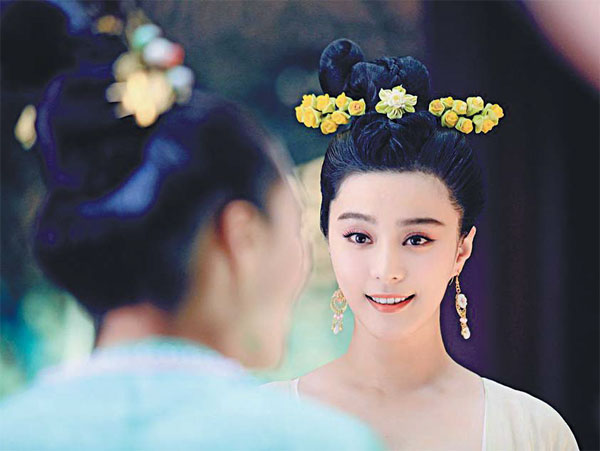Squeezed out by censor

Controversy over cuts of the actresses' corseted cleavages in a Chinese TV drama has attracted attention abroad
The much talked about cut of the first Chinese empress' bust has not only not died down, it has also created a buzz abroad.
Numerous international media outlets, including The New York Times, the Wall Street Journal and The Daily Mail, reported on the heated chatter in the Chinese media and blogosphere about how the top-rated domestic TV drama, The Empress of China - also known as The Saga of Wu Zetian - was halted after its first week of release for "technical reasons", then released again five days later.
| Fan Bingbing, who plays empress Wu Zetian in the TV drama The Saga of Wu Zetian. The series has drawn further public attention after an attempt to cut "too revealing" shots in the 80-episode Hunan TV serial. Photos provided to China Daily |

What happened was that when the 80-episode Hunan TV serial returned to the screen on the first day of 2015 after the abrupt suspension, scenes featuring the actresses' low-cut dresses and corseted cleavages had been cut and replaced by close-up shots of just their pretty heads.
A series of "before and after" screen captures of the drama shows that even the Chinese emperor Li Shimin's face has been cut in an after scene, when he is leaning his head against the empress' ample breasts.
It has been widely speculated that the nation's highest broadcasting regulator had asked for the cuts because the women's costumes were too revealing.
Chinese netizens created a slew of viral spoofs, such as nicknaming the drama The Saga of Big Head Wu, and cropping out the busts of some of the well-known stars' movie photos.
Sina Weibo, the Chinese equivalent of Twitter, found that nearly 95 percent of the viewers disapproved of the cuts, calling them "unnecessary".
"Censorship should have a clearer standard and be more flexible," says Zhang Baiqing, head of the China Film Critics Society and a member of the movie censorship committee that is part of the State Administration of Press, Publication, Radio, Film and Television.
He believes that the hit drama might have passed censorship before its nationwide premiere, but might have then be pulled off the air for the two reasons.
It may have been because some viewers had complained to authorities or some high-status official ordered a re-examination of the drama because of concerns about its possible 'bad' social influence, he says.
"But whatever the case is, the cuts were unnecessary. Foreign countries have a complete system of 'dos and don'ts'. But our country's regulations are ambiguous."

Chinese authorities rule that movies and television productions should not have pornographic contents, but plunging necklines and corseted breasts do not constitute pornography. It may be a matter of taste, says the Hangzhou-based researcher.
Yin Hong, executive deputy president of the journalism and communication school at Tsinghua University, agrees.
The hit drama had already been controversial before the suspension, but the "arbitrary" cuts cannot mitigate the heat of the debate, he says.
The biographic work of Wu Zetian (AD 624-705), the first and only female emperor, who reigned from AD 690 to 705, had a record rating of 2.28 percent in a 50-city survey, just on the first day of its screening. But some viewers on Baidu Tieba, one of the country's largest online forums, joked that they had been drawn to the big-budget serial for the actresses' half-exposed breasts.
"If there was a debate, let the public thrash it out," Yin says. "The abrupt halt to the serial and the cuts will only attract more attention. There have been many similar situations before. We don't seem to learn from them."
"The drama had been criticized for its mediocre plot and coarse dialogues before the removal. But now, it has the support of many people."
Raymond Zhou, veteran film critic with China Daily, says: "It had been bad, but now it may become a good thing."
He cites the famed "Streisand effect" to show its similarity to the Chinese actress Fan Bingbing-starring drama. That description refers to efforts by the American entertainer Barbra Streisand's to suppress photographs of her residence in California but instead drew further public attention to it.
Zhou says that ancient scrolls and documents show that during Wu's reigning dynasty, it was the custom for women to wear clothes that bared their necks and shoulders. The breasts might not have been as "squeezed" as those depicted in the drama.
But other experts agree with the need for the cuts.
Wang Xudong, director of China Film Critic Society Academic, says television brings images into the living room. "It may not be good for our young to see exposed women's bodies. TV projects should have an educational influence," he says.
xufan@chinadaily.com.cn
(China Daily Africa Weekly 01/09/2015 page28)
Today's Top News
- Opportunities, policies lure overseas talent back
- Asia-Pacific community highlighted at meeting
- Takaichi using old tricks with new words
- White paper outlines security path for HK
- Nation's digital trade surplus doubles in 2025
- Xi extends Spring Festival greetings































